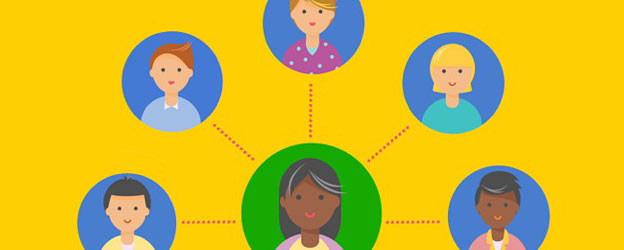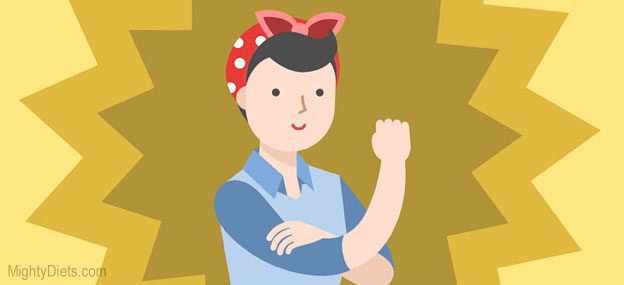U.S News recently asked a panel of health experts to rank diets based on “fast weight loss“ in their annual list of the best diets. At the top of their list are popular diets like Keto, Atkins, and HMR. However, you probably won’t notice the not-so-obvious disclaimer on the same page that says,
“Keep in mind that short-term weight loss is markedly different from long-term weight loss, which is more important for your health.”
Hmmm. perhaps that’s why their #1 diet for short-term weight loss, HMR, doesn’t even make the top 25 for “best overall diet?” I also see that the #2 diet for “fast weight loss,” the insanely popular Keto diet, doesn’t even break the top 30! (Yikes!)
So, why do diets that score so well short-term fall apart over time? It’s because they have a narrow approach to dieting that is measured solely by a scale. This approach doesn’t account for the most important components of a successful diet, including the crucial psychological component.
Here are 3 big reasons why fast weight loss diets are doomed to fail long-term.
1. Your Brain Doesn’t Like Fast Weight Loss!

When studying why most people gain back their initial fast weight loss, scientists made an interesting discovery. Abrupt caloric restriction frequently leads to increased cravings and hunger, often for sweet, salty, and fatty foods; but why?
Well, it seems that our brains don’t like when we abruptly slash the number of calories that we consume. In fact, when our brains sense that we are losing weight quickly, they “help” by attempting to put the weight back on; recalibrating our bodies to burn calories slower to get us back to our familiar weight.
This appears to be a survival instinct deep in our DNA that fears hunger and starvation. So, you could say that fighting fast weight loss is a survival instinct!

Cornell professor, David Levitsky, Ph.D., adds that “The body has had millions of years to develop mechanisms to resist starvation. You cannot bypass them by simply going on a diet.”
2. The “Diet Mentality” Doesn’t Last

Many diets approach weight loss and nutrition as a temporary state of mind. That means we set our goal as an endpoint, instead of understanding that sustainable weight loss requires long-term behavioral change. Instead of viewing weight loss as a lifelong lifestyle change, diets approach the process like it’s a race or boot camp. However, there’s no real plan for when the race ends!
The Academy of Nutrition and Dietetics supported this idea in their 2013 position paper, stating that:
“Focusing on variety, moderation, and proportionality in the context of a healthy lifestyle, rather than targeting specific nutrients or foods, can help reduce consumer confusion and prevent unnecessary reliance on supplements. Proactive, empowering, and practical messages that emphasize the total diet approach promote positive lifestyle changes.”
In other words, sustainable health and maintaining a healthy weight is not about “good” or “bad” foods, or counting calories. It’s about teaching you food choices and behavioral change that should last a lifetime.
*Related: Why Fitness Trackers (Alone) Don’t Work
3. Psychology is Key

So, you’ve ordered a month of protein shakes and vow to never eat bread again? Or, perhaps you’ve signed up for an expensive meal-delivery diet? You might be happy to see the pounds melt off the first month or two, but you likely haven’t acknowledged one of the most important parts of sustainable weight loss: the psychological component.
Starving yourself might lower the number on your scale, but it doesn’t address all of that stress you’re under at work or your life-long emotional relationship with eating. Any “fast weight loss” diet that doesn’t recognize the crucial role of psychology in weight loss is doomed to failure.
It’s important to understand yourself better, but the support of others is also vital. We are social by nature, and generally accomplish bigger and better things when we work together. If you plan to “go it alone” on that diet, research concludes that you’re probably headed for failure.

Did you ever think about what a football game, musical, or marathon would look like without an audience or coaches? That might seem like an absurd thought, but people offering support, motivation, and guidance can be just as important to a personal journey, like weight loss.
Many popular diets are asking you to perform without a supportive audience, and that’s really hard!
A Fast Better Way to Lose Weight?
Research overwhelmingly concludes that diets promising fast weight loss are doomed to failure. These diets are selling you a profoundly incomplete product that is probably worthless long-term, and at worst physically and mentally harmful.
So, instead of chasing fast weight loss results, what should you do? There are few diets out there that include these essential components of sustainable long-term weight loss. However, one company is poised to revolutionize the entire weight loss industry: Noom.

“Everyone is Googling Noom.” That statement didn’t make any sense a generation or two, but now its causing commercial diets like WW to rethink everything they thought they knew about weight loss.
And, Noom has been one of the most searched diets for good reason. On their homepage, they ask you to, “stop dieting,” and “get life-long results.” Clearly, they saw the disconnect between “losing weight fast,” and losing weight sustainably, and decided to disrupt the whole industry by creating a better program. Interestingly, the Noom app was created by a team of behavioral psychologists, affirming their focus on the all-important psychological component.
In fact, we decided to try Noom ourselves and were really impressed with pretty much everything about it. In fact, if you’d like to learn more, you can start with their free 30-second evaluation online, which concludes with an offer for a 14-day trial. Check it out below, and let us know what you think!


